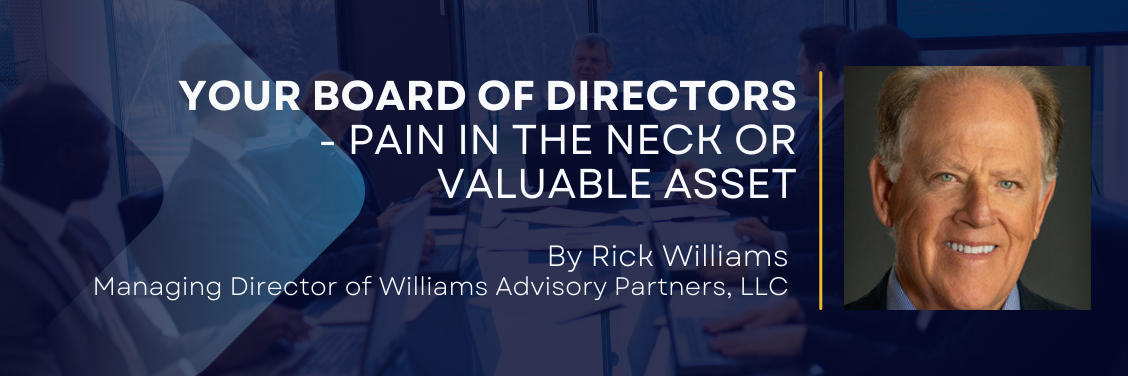Your Board of Directors - Pain in the Neck or Valuable Asset

“I don’t need or want a board of directors!” This is the view of many owners of small to medium-sized companies. “I’m doing OK.” If your goal is to make your company more successful, working with a fully functioning board of directors will materially improve your chances for success. Operating as a resource, a coach, a big question decider, a risk manager, and the center of governance, your board can be a valuable asset for your company.
High Performance Is A Choice
Setting high standards and expectations for yourself, your team, and your company is an option. You can choose that path, or you can choose a less challenging path. Think about a board of directors for your company in that light. If you believe your company will meet your expectations mostly on the basis of decisions you can make by yourself with occasional advice from advisors in your circle, don’t bother with an active board. If you have high-performance expectations for yourself and your company, putting a High-Value Board in place should be one of your core building blocks.
A Board of Directors is a Pain in the Neck!
Being your own boss not accountable to anyone is an easier way to run a company. Many company owners started their business for just that reason.
A lifestyle company with no one looking over your shoulder could be the way to go. The arguments against a board that sets expectations and holds the CEO accountable go like this:
- I am doing OK without a board.
- A board takes a lot of my time and my team’s time.
- I have to educate the board about my business.
- How can they help me when I know more than they do?
- The board will not grow my revenues or profits next quarter.
Creating what I call a “High-Value Board” does require an investment of time and a relatively modest expense. The return on that investment will not be in the next quarter. If you, your investors, your team and your family have higher expectations for the company, the improved performance and long-term value creation are well worth the hassle factor of having a High-Value Board.
Why Have a High-Value Board?
The board must assure that the company complies with its public charter as a corporation. While that responsibility is at the core of a board’s role, this discussion focuses on the value the owners and senior leadership of the company receive from a High Value Board.
- Added Resources - Board members bring their network to the company.
- Coach, Advisor, Sounding Board - Every CEO needs trusted advisors and coaches who understand the company and will listen and advise without an agenda of their own.
- Accountability - The board is the forum for establishing plans and goals for the company. The board reviews and evaluates performance on behalf of the shareholders.
- Risk Manager - The CEO is responsible for offense. The board is responsible for defense. What could go wrong - really wrong?
- More Valuable Company - The combination of leveraging board resources, seeking counsel, being accountable, avoiding big mistakes and building credibility will make your company more successful and more valuable - for your shareholders and yourself
What is the Board’s Job and Its Role?
The board of directors does NOT manage the company. Management of the company is the responsibility of the CEO and the leadership team.
A High-Value Board will:
- Provide governance for the corporation - compliance with laws & regulations
- Hire and fire the CEO
- Approve strategy, policies & procedures
- Monitor performance
- Manage risks
- Approve material transactions
- Review and approve financial plans and reports
- Assure accurate reports to shareholders - equal visibility to all shareholders
When the board is diligently performing these roles over time - not easy to do - the overall performance of the company and its leadership will improve. Higher expectations produce higher performance.
How the Board Does Its Work?
The board works by consensus whenever possible. The board’s process is dialogue, probing questions, what if, what can we agree on? Board organization includes:
- Board Chair - The chair manages the board and its agenda in consultation with the CEO. For smaller companies, the chair is often the CEO.
- Board Committees - Audit and Compensation are standard board committees.
- Board Size - Generally, the board will be 5 to 11 members - an odd number.
- Board Members - The CEO should be a board member. Major outside investors will be represented on the board. Independent board members bring specialized expertise or a broader understanding of how companies similar to yours operate and compete. Diverse points of view are essential when expressed constructively.
- Executive Sessions - Executive board meetings without company management present are a must. For lots of reasons, discussions are more open and frank when the CEO and other management are not part of the conversation. If the CEO is the board chair, the board should select a lead independent director to conduct executive sessions.
Making Your Board of Directors into a Valuable Asset for Your Company
Here are steps you can take to make your board into a powerful member of your corporate team and improve your chances for success.
- Create a board with a combination of relevant expertise and diverse experience and points of view.
- Include board members who will commit the time to understand the company and do the work you need from the board.
- Major investors will want board representation. Be clear that being on the board means they are representing all shareholders and not just their interests.
- Invest your time to educate the board. They need to understand the policy, procedures, culture, strategy, risk, and governance.
- Don’t keep secrets from the board. Trust and candor are essential.
- Ask for feedback, options, advice - don’t be silent hoping the board does not ask questions.
- Make the board part of your team - not a problem to be managed.

ABOUT RICK WILLIAMS
Rick Williams is Managing Director of Williams Advisory Partners, LLC. He has a breadth of experience as an executive and board director for technology companies including medical technology, software, and financial services. Rick is a nationally published thought leader. Rick is past President of the Harvard Business School Association of Boston. He was a management consultant with the global consulting firm Arthur D. Little, Inc. He is a physics graduate of the University of Pennsylvania. Rick’s soon to be published book entitled “Create the Future – for your company and yourself” is a “how to field guide” for leaders who want to think creatively about where to take their organization.
